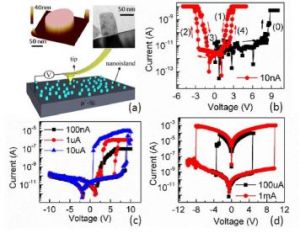A team at the University of California, Riverside Bourns College of Engineering has developed a novel way to build what many see as the next generation memory storage devices for portable electronic devices including smart phones, tablets, laptops and digital cameras.
 A series of images that shows the zinc oxide nano-island on silicon and the three modes of the operation.
A series of images that shows the zinc oxide nano-island on silicon and the three modes of the operation.
The device is based on the principles of resistive memory, which can be used to create memory cells that are smaller, operate at a higher speed and offer more storage capacity than flash memory cells, the current industry standard. Terabytes, not gigbytes, will be the norm with resistive memory.
The key advancement in the UC Riverside research is the creation of a zinc oxide nano-island on silicon. It eliminates the need for a second element called a selector device, which is often a diode.
“This is a significant step as the electronics industry is considering wide-scale adoption of resistive memory as an alternative for flash memory,” said Jianlin Liu, a professor of electrical engineering at UC Riverside who is one of the authors of the paper. “It really simplifies the process and lowers the fabrication cost.”
The findings were published online this week in the journal Scientific Reports, which is part of Nature Publishing Group. The paper is called “Multimode Resistive Switching in Single ZnO Nanoisland System.”
Liu’s co-authors were: Jing Qi, a former visiting scholar in Liu’s lab and now an associate professor at Lanzhou University in China; Mario Olmedo, who earned his Ph.D. from UC Riverside and now works at Intel; and Jian-Guo Zheng, a director of the Laboratory of Electron and X-ray Instrumentation at UC Irvine.
Flash memory has been the standard in the electronics industry for decades. But, as flash continues to get smaller and users want higher storage capacity, it appears to reaching the end of its lifespan, Liu said.
With that in mind, resistive memory is receiving significant attention from academia and the electronics industry because it has a simple structure, high-density integration, fast operation and long endurance.
Researchers have also found that resistive memory can be scaled down in the sub 10-nanometer scale. (A nanometer is one-billionth of a meter.) Current flash memory devices are roughly using a feature size twice as large.
Resistive memory usually has a metal-oxide-metal structure in connection with a selector device. The UC Riverside team has demonstrated a novel alternative way by forming self-assembled zinc oxide nano-islands on silicon. Using a conductive atomic force microscope, the researchers observed three operation modes from the same device structure, essentially eliminating the need for a separate selector device.
UC Riverside’s research effort was partially supported by the Defense Microelectronics Activity and the Microelectronics Advanced Research Corporation.
Source: http://www.ucr.edu/